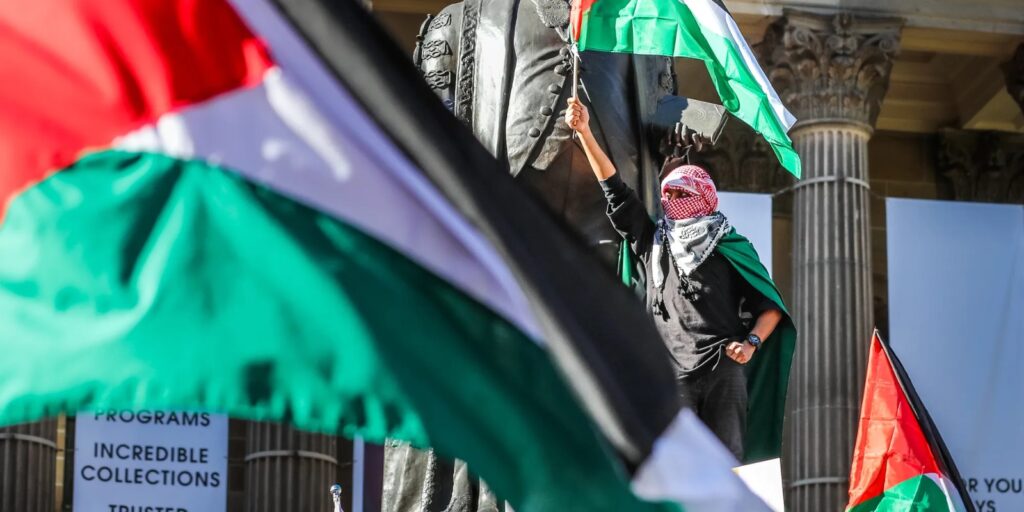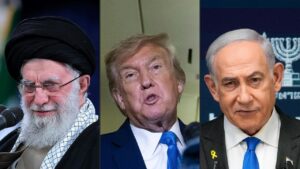
(File: Getty Images)
Palestine: Where is the Muslim voice?
By Ebrahim Rasool
In the October 2024 edition of Al-Qalam, in my Strategy and Statecraft column, I posed the provocative question: ‘Will Israel’s impunity make its endgame prevail?’ and concluded pessimistically that given Palestinian fragmentation, Arab submission, Western complicity & Israeli impunity, the balance of power favours the emergence of a de facto Israeli state from the river to the sea – with Palestinian enclaves (homelands).
Most responses to this article were saddened by the conclusion but appreciated the analysis based on weighing up the unfavourable balance of power against the favourable, but still nascent, balance of forces, including South Africa’s role in mobilising such forces. But there was one response, in particular, that I feel compelled to respond to because it comes from a dear friend whom I regard as a pre-eminent Muslim scholar of our time capable of thinking the Ummah out of our inertia. He appreciated my ‘experienced analysis” but lamented “the missing Muslim voice here” and challenged that I should consider incorporating it.
By the ‘Muslim voice’, he would mean asserting that Israel could achieve their endgame in the next few months but, together with the Western empire, ‘fall and fail at the end’ because ‘this is what our faith tells us.’ He points to the SA people’s victory over apartheid as evidence in point. All of these are valid and affirm the idea of faith as belief in that which we have not yet seen and the ultimate power of the Divine. Hopefully, he is correct in his analysis and prediction for those who have seen the suffering visited upon Palestine and now the Lebanese at the hands of Zionist brutality. We wish it to be so. But let me deal with the Muslim voice that indeed responds to what is seen, what appears as the Sunnah of Allah (the methodology of God), and what is analysed so that analysis is the basis of strategic planning.
It is indeed the Sunnah of Allah that all creation ‘follow courses exactly computed’, asserting the natural laws of existence. Allah has made Muslims historically the pre-eminent scientists to lead in understanding these ‘courses’ whether in astronomy, medicine, mathematics, physics, engineering, etc. Today, we accept the fact of gravity.
While the social component of these laws of existence is emerging and lends itself to debate – as with the natural sciences initially – there are indeed “courses” in social sciences or social laws of existence. Their observance or not can lead to fairly predictable political, economic, and social outcomes, often despite the issues of justice that may make such outcomes unpalatable. I’m sure that 100 years ago, when the Ottoman Empire was rolled back from Europe, the Balkans, the Stan’s in Asia, and Asia Minor into what is today Türkiye, there were also those who felt the injustice and predicted its reversal very soon.
But social science does not, like gravity, simply upend itself against the motive elements that are obtained at that moment in that context. It has decreed that we live with today’s borders of Türkiye, with the expulsion of Muslims from Andalucía, with how Sykes-Picot had redrawn the map of the Muslim world, all the while decrying the injustice, praying for reversal, and never compromising our faith (Imaan) just because Allah does not share our urgency to overturn the ‘course’ of the social laws of existence.
Another truth to consider is that these ‘courses’ of social science – like their equivalents in natural science – also have laws by which they operate because, indeed, Allah neither deprives human beings of agency nor micro-manages human operations. Thus, the ‘Muslim voice’ also understands these operational laws and principles and can discern when they are at work, when they are undermined, and, therefore, when they create regrettable consequences for ordinary, decent people and when they create ascendancy for the most reprehensible amongst us.
So, what are some of these underlying laws and principles?
Firstly, it is the law of social science, as expressed in the Qur’an, that Allah does not change the condition of people until they change that which is amongst themselves. An external change is conditional on an internal re-organisation and positioning. It is not that Allah wishes suffering or is unduly testing the Palestinians, but they may be alerting all of us to the need for re-organization and repositioning so that the “courses” of social science are rebalanced and become favourable to the vulnerable victims of injustice.
Secondly, the law that we shall have nothing but what we strive for, again, as expressed in the Qur’an, tells us that input leads to output and outcome: Strategic planning leads to its outcomes, as we evidenced at Hudaibiyah in the debate between the master strategist, the Prophet (SAW), and a tactical desire by Umar (RA) in which the vision of a liberated Makkah prevailed through a strategy encompassing a shifting balance of both forces and power.
Thirdly, Surah Rum (the Roman Empire) teaches how to exploit an interregnum when the superpowers of the time were exhausted and depleted and how then to tackle their proxies (Qureish) in a complex and comprehensive set of strategic interventions ranging from a strategic retreat to strategic state-building.
Amongst many more, the “courses” require a coherent vision of a just endgame or outcome, which gives synergy to the strategy, which, in turn, makes the tactics proactive. This ultimately gives buy-in to the fundamental correctness and morality of the cause, which the Palestinians increasingly enjoy, but it can easily get lost in a fragmented leadership, in being forced into a reactive position, and with an imbalance in the balances of both power and forces.
The Muslim voice believes that, ultimately, truth will prevail because, by its nature, falsehood must perish. But it will perish through the agency of being Khalifatullah fil Ard – God’s vicegerents on Earth. South Africa’s people, in the face of our own apartheid, adopted such agency, sifted its leadership, designed appropriate pillars of struggle, sequenced their deployment, adapted organisational form, shifted the balance of forces both in SA and in the capitals of the West, and then defined what instruments of power would be unleashed, rather than allowing the enemy to lure us onto their terrain of strength.
Our job is to constantly be an assistance to the Palestinians in analysing, strategising and struggling through our awareness of, and alertness to, the natural laws of social existence.
Ebrahim Rasool is the former Ambassador to the US and former Premier of the Western Cape.


